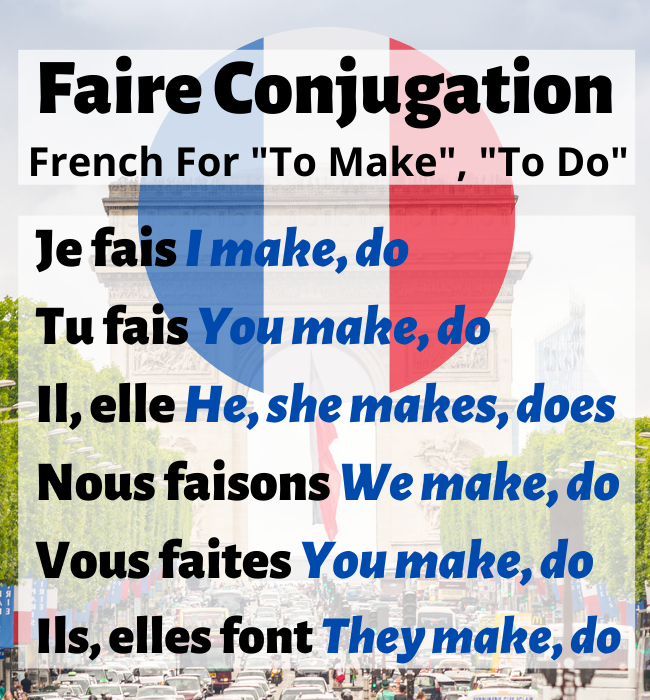Conjugation tables for faire in French
The French verb faire is one of the most commonly used verbs in the language. The two main meanings of faire are “to make” and “to do”. The present tense conjugation of faire is: Je fais (I do), Tu fais (You do, familiar), Il, elle fait (He, she does), Nous faisons (We do), Vous faites (You do, plural, formal) and Ils, elles font (They do). Keep reading to find the complete Faire conjugation tables with example sentences.
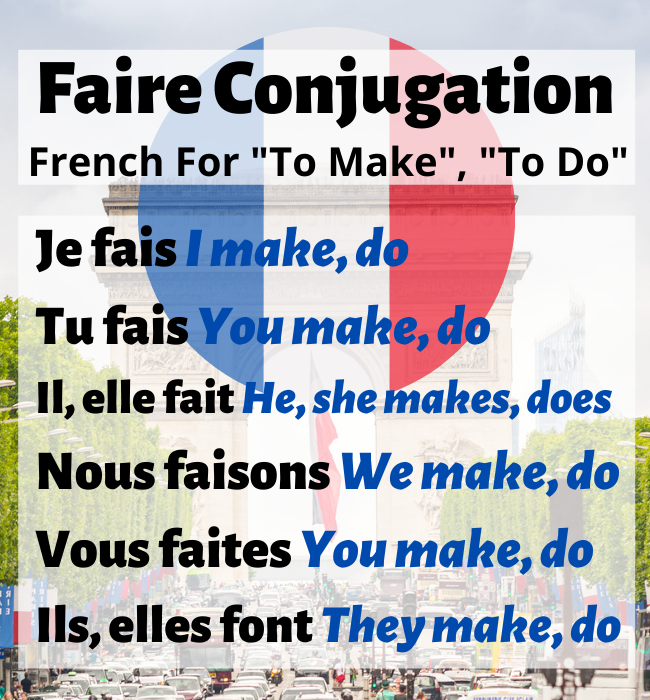
The verb faire is also used in a wide variety of idiomatic expressions.
Faire is an irregular verb. This means that when conjugated in the present tense, its verb endings to not follow the same patterns as regular verbs in the -er group.
This post provides verb tables of faire in the following tenses:
- present tense, compound past (passé composé)
- simple past (passé simple)
- imperfect (imparfait)
- near future (futur proche)
- simple future (futur simple)
- past future (futur antérieur)
- conditional mood (présent du conditionnel)
- present subjunctive (subjonctif)
- imperative (impératif) and gerund.

Idiomatic Uses of Faire: How to use this versatile verb
The French verb faire is used in many French idiomatic and cultural expressions. We’ve included lots of these idiomatic expressions in our example sentences in the verb tables below.
Weather expressions with faire
The following is a sample list of French weather expressions which use faire. The grammatical construction is: Il fait + weather condition. Here you can find a complete list of French weather terms.
- Il fait beau. It’s nice weather.
- Il fait mauvais. It’s bad weather.
- Il fait froid. It’s cold out.
- Il fait chaud. It’s hot out.
- Il fait du soleil. It’s sunny out.
- Il fait du vent. It’s windy out.

Sports and activities
Faire is also used for sports, activities and hobbies. The grammatical structure is faire + de + le/la/les + activity name. The de + le/la/les gets contracted into du, de la and d’. Below we’ve included a brief list.
- Faire du sport to do sports
- Faire des exercises to do exercises
- Faire du vélo to go bike riding
- Faire du ski to go skiing
- Faire de la natation To go swimming
- Faire de la randonnée To go hiking
Common faire expressions
Here are some of the most commonly used expressions which use the verb faire. There are many more uses faire.
- Faire du shopping to go shopping
- Faire des courses to do errands, go shopping
- Faire le ménage to do housework
- Faire la vaisselle to do dishes
- Faire la lessive to do laundry
- Faire le pont to take a long weekend
- Faire les devoirs to do homework
- Faire attention to be careful, watch out
- Faire la fête to party
- Faire le lit to make the bed
- Faire la tête to sulk
This page provides much more extensive list of faire expressions.
Causative construction
In French grammar, faire is used in what’s called the causative construction to indicate having something done.
The grammatical construction faire + infinitive is used to express having something done (by somebody else).
- Je fais réparer la voiture. I have the car repaired.
- Je fais faire un costume. I have a suit made.
- Je fais nettoyer la cuisine. I have the kitchen cleaned.
School subjects
The verb faire can also be used for studying ‘doing’ school. Again the grammatical construction is faire + de + le/la/les + subject. This page offers a complete list of French school subject vocabulary.
- J’ai fait du Chinois à l’université. I studied Chinese in university.
- Marie fait de la biologie au lycée. Marie studies biology in high school.
- Pierre fait des maths au collège. Pierre studies math in middle school.
Se faire – forme pronominale
Following the causative form above, se faire + infinitive means to have somebody else carry out an action onto the subject. Here are two examples.
- Martin se fait vacciner. Martin gets vaccinated.
- Éric se fait rouler. Eric gets ripped off.
In an impersonal expression se faire translates to “is it that”.
- Comment se fait-il qu’il est arrivé si tard? How is it that he arrived so late?
Se faire is a passive voice to mean “is done”.
- Ça se fait pas en France! That isn’t done in France! (You don’t do that in France!)
Distance
Faire can mean to cover in terms of covering distance.
- J’ai fait huit cent miles en un jour. I covered (went) 800 miles in one day.
Faire Conjugation French: Charts & Tables
Present Indicative (present tense)
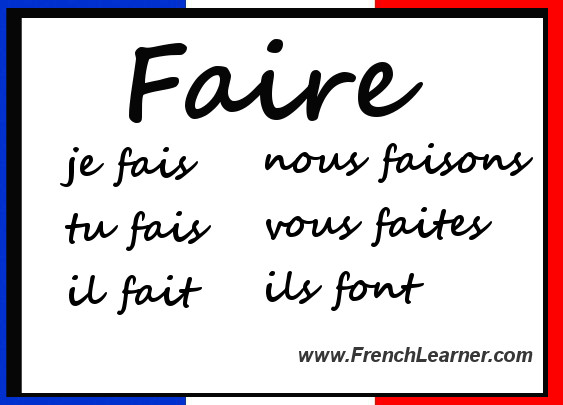
The following chart shows faire conjugated in the present tense (le présent de l’indicatif).
| Je fais | I make, do | Je fais mon lit. | I make my bed. |
| Tu fais | You make, do (familiar) | Tu fais un voyage en France. | You take a trip to France. |
| Il, elle, on fait | He, she, on makes, does | Elle fait du jogging au parc. | She jogs in the park. |
| Nous faisons | We make, do | Nous faisons un gâteau pour ton anniversaire. | We make a cake for your birthday. |
| Vous faites | You make, do (formal, plural) | Vous faites du shopping avant la fête. | You go shopping before the party. |
| Ils, elles font | They make, do | Ils font grève aujourd'hui. | They're on strike today. |
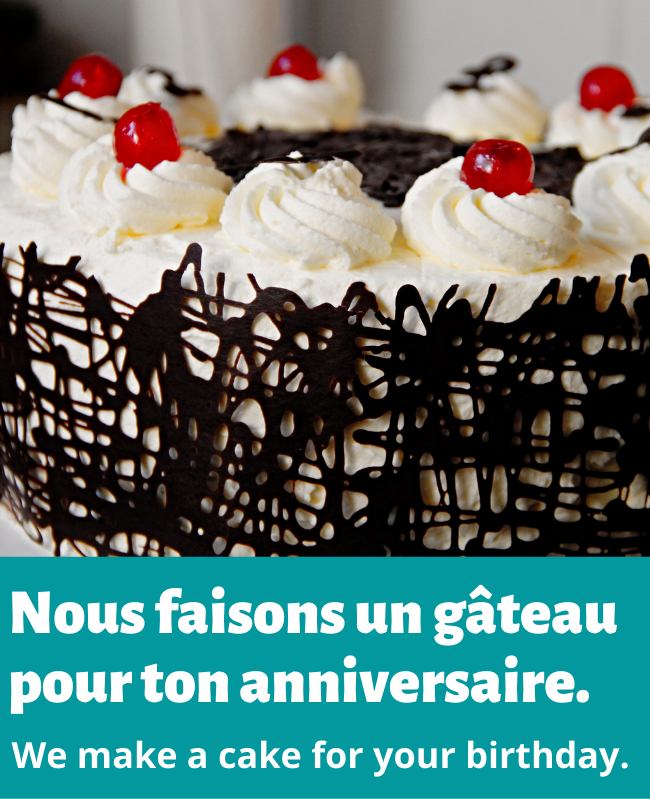
Compound past (passé composé)
The French passé composé is used to describe actions which occurred at a specific moment in time. For the verb faire, it the passé composé is formed by combining the present tense of the verb avoir (to have) with the past participle “fait”.
| J'ai fait | I made, did | J'ai fait une bêtise. | I made a mistake. |
| Tu as fait | You make, did (familiar) | Tu as fait un effort. | You make an effort (or you tried). |
| Il, elle, on a fait | He, she, one made, did | Elle a fait une pizza pour les enfants. | She made a pizza for the kids. |
| Nous avons fait | We made, did | Nous avons fait un voyage en Espagne. | We took a trip to France. |
| Vous avez fait | You made, did (plural, formal) | Vous avez fait du ski en Argentine. | You went skiing in Argentina. |
| Ils, elles on fait | The made, did | Ils ont fait le tour du monde en 80 jours. | They traveled around the whole world in 80 days. |
Simple past (passé simple)
The simple past or passé simple is a literary past tense and equates grammatically to the passé composé.
Given that this tense is mostly used used in literary works, it’s most common to see the third-person singular (il and elle) and third-person plural (ils, elles) forms: Il/elle fit and Ils/elles firent.
| Je fis | I made, did | Je fis un voyage en Europe. | I took a trip to Europe. |
| Tu fis | You made, did (familiar) | Tu fis un grand chef-d'œuvre. | You make a great masterpiece. |
| Il, elle, on fit | He, she, one made, did | Elle fit un beau tableau. | She made a beautiful painting. |
| Nous fîmes | We made, did | Nous fîmes connaissance il y 20 ans. | We met 20 years ago. |
| Vous fîtes | You made, did (plural, fomral) | Vous fîtes construire le pont. | You had the bridge built. |
| Ils, elles firent | They made, did | Ils firent démolir le bâtiment. | They had the building demolished. |
Imperfect (imparfait)
The French imperfect tense (l’imparfait) is used for describing past actions that occurred during undefined periods of time.
“Je faisais” translates to “I used to do”, I used to make”, “I was doing” and “I was making”.
Thus, in the verb table below, translations include “was making”, “was doing”, “used to make” and “used to do”.
| Je faisais | I was doing, used to do / was making, used to make | Je faisais mes devoirs quand tu as téléphoné. | I was doing my homework when you called. |
| Tu faisais | You were doing, used to do / were making, used to make (familiar) | Tu faisais du ski quand tu étais un enfant. | You used to ski when you were a child. |
| Il, elle, on faisait | He, she one was doing, used to do / was making, used to make | Elle faisait une pizza quand papa est retourné à la maison. | She was making a pizza when dad came home. |
| Nous faisions | We were doing, used to do / were making, used to make | Nous faisions nos devoirs quand tu as appelé. | We were doing our homework when you called. |
| Vous faisiez | You were doing, used to do / were making, used to make (formal, plural) | Vous faisiez du français quand tu étais un étudiant. | You studied French when you were a student. |
| Ils, elles faisaient | They were doing, used to do / were making, used to make | Ils faisaient de la voile quand ils étaient au lycée. | They used to sail when they were in high school. |

Near future (futur proche)
The near future tense is a future tense that combines the present tense of aller as an auxiliary verb with and infinitive. Hence, “Je vais faire” translates to “I will make”, “I will do”, “I am going to make” and “I am going to do”.
| Je vais faire | I am going to make, do | Je fais faire un gâteau. | I'm going to make a cake. |
| Tu vas faire | You're going to make, do (familiar) | Tu vas faire du ski ce week-end. | You're going to go skiing this weekend. |
| Il, elle, on va faire | He, she, one is going to make, do | Elle va faire une pizza pour sa famille. | She's going to make a pizza for her family. |
| Nous allons faire | We are going to make, do | Nous allons faire un voyage ensemble. | We are going to take a trip together. |
| Vous allez faire | You are going to make, do (plural, formal) | Vous allez faire des exercises au parc. | You are going to exercise in the park. |
| Ils, elles vont faire | They are going to make, do | Ils vont chanter devant le public. | They are going to sing in front of the audience. |
Simple future (futur simple)
The simple future is another French future tense which has a slightly less degree of certainty than the futur proche. For the verb faire, it is formed by adding the appropriate ending the stem -fer.
| Je ferai | I will make, do | Je ferai du ski ce week-end s'il fait beau. | I will go skiing this weekend if it's nice weather out. |
| Tu feras | You will make, do (familiar) | Tu feras un voyage cet ete si tu as assez de temps. | You will take a trip this summer if you have enough time. |
| Il, elle, on fera | He, she, on will make, do | J'espère qu'il fera beau ce week-end. | I hope it will be nice out this weekend. |
| Nous ferons | We will make, do | Nous ferons une salade niçoise pour le dîner. | We will make a Nicoise salad for dinner. |
| Vous ferez | You will make, do (plural, formal) | Vous ferez de la natation si la piscine est ouverte. | You will go swimming if the pool is open. |
| Ils, elles feront | They will make, do | Ils feront les valises avant de partir en vacances. | They will pack their bags before going on vacation. |
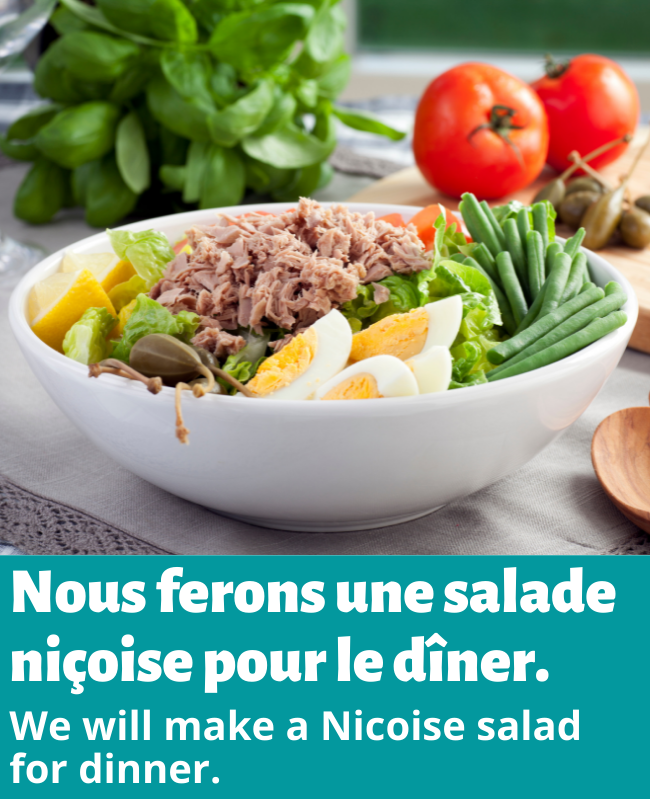
Past future (futur antérieur)
The French past future tense (futur antérieur) is used to describe actions that will have happened in the future. For the verb faire, it is formed by combining avoir in the simple future as an auxiliary verb with the past participle “fait”.
Hence, “J’aurai fait” translates to “I will have made” or “I will have done”.
| J'aurai fait | I will have made, done | J'aurai fait mon lit avant de quitter la maison. | I will have made my bed before leaving the house. |
| Tu auras fait | You will have made, done (familiar) | Tu auras fait tes devoirs d'ici 21h00. | You will have done your home work by 9.00pm. |
| Il, elle, on aura fait | He, she, one will have made, done | Elle aura fait des progrès d'ici la fin de l'année. | She will have made progress by the end of the year. |
| Nous aurons fait | We will have made, done | Nous aurons fait du ski avant la fin de la saison. | We will have skied before the end the season. |
| Vous aurez fait | You will have made, done (plural, formal) | Quand il arrivera, vous auriez fait une pizza. | When he arrives, you will have made a pizza. |
| Ils, elles aurons fait | They will have made, done | Ils auront fait du shopping avant l'arrivé des invités. | They will have gone shopping before the arrival of the guests. |
Conditional mood (présent du conditionnel)
The conditional tense (présent du conditionnel) is used to express hypothetical situations. It is the “would” tense. For the verb faire, it is formed by combing the appropriate ending with the stem -fer.
Hence, “Je ferais” translates to “I would make” and “I would do”.
| Je ferais | I would make, do | Je ferais mes devoirs si j'avais assez de temps. | I would do my homework if I had enough time. |
| Tu ferais | You would make, do (familiar) | Tu ferais un voyage si tu avais assez de d'argent. | You would take a trip if you had enough money. |
| Il, elle, on ferait | He, she, one would make, do | Il ferait du ski s'il y avait assez de neige. | He would go skiing if there was enough snow. |
| Nous ferions | We would make, do | Nous ferions une pizza si nous avions plus de fromage. | We would make a pizza if we had more cheese. |
| Vous feriez | You would make, do (plural, formal) | Vous feriez moins de bêtises si vous faisiez plus attention. | You would make few mistakes if you paid closer attention. |
| Ils, elles feraient | They would make, do | Ils feraient constuire une maison s'ils avaient un prêt bancaire. | They would build a house if they had a bank loan. |

Present subjunctive (subjonctif)
The subjunctive mood (subjonctif) is used to express wishes, emotions and doubts. Thus, “que je fasse” translates to “that I make” and “that I do”.
| que je fasse | that I make, do | Il faut que je fasse mes devoirs. | I have to do my homework. |
| que tu fasses | that you make, do (familiar) | Je veux que tu fasses une pizza. | I want you to make a pizza. |
| qu'il, elle, on fasse | that he, she, one makes, does | Je doute qu'il fasse son travail. | I doubt he's doing his work. |
| que nous fassions | that we make, do | Il faut que nous fassions plus attention. | We have to pay closer attention. |
| que vous fassiez | that you make, do (formal, plural) | Je suis content que vous fassiez du progrès. | I'm glad you're making progress. |
| qu'ils, elles fassent | that they make, do | Je souhaite qu'ils fassent un repas. | I hope they make a meal. |

Imperative (impératif)
The French imperative mood (impératif) is the commanding tense. Hence, in the affirmative imperative and tu (you familiar) form, “Fais!” means “Make!” or “Do!”.
In the negative imperative and tu form, “Ne fais pas!” translates to “Don’t make!” or “Don’t do!”.
Positive imperative
| Fais! | Make! Do! (tu, familiar form of you) | Fais tes devoirs! | Do you homework! |
| Faisons! | Let's make! Let's do! | Faisons du ski! | Let's go skiing! |
| Faites! | Make! Do! (vous, formal and plural you) | Faites attention! | Watch out! |
Negative imperative
| Ne fais pas! | Don't make! Don't do! | Ne fais pas ça! | Don't do that! |
| Ne faisons pas! | Let's not make! Let's not do! | Ne faisons pas comme les autres! | Let's not do things like everybody else! |
| Ne faites pas! | Don't make! Don't do! | Ne faites pas de bêties! | Do make any silly mistakes! |
Gerund (gérondif)
The French gerund combines the preposition “en” with the present participle of the verb. Hence, for the verb faire, “en faisant” translates to “while doing” or “while making. Here are some example sentences:
- Je me suis coupé le doigt en faisant la cuisine. I cut my finger while cooking.
- Tu as pris de belles photos en faisant du ski. You took some nice pictures while skiing.

